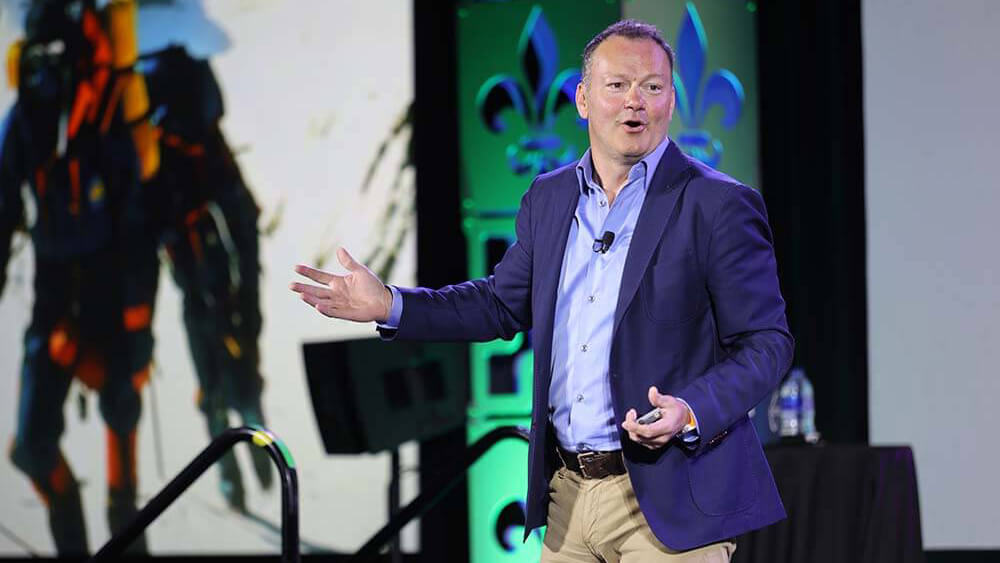
When he’s not on the road inspiring EduCon attendees and other audiences with his motivational speeches, Jamie Clarke is instructing students as an adjunct professor at the University of Calgary’s Centre for Advanced Leadership.
When Jamie Clarke looks back at one of his failed attempts to summit Mount Everest, it wasn’t fear or avalanches or inclement weather that prevented his team from reaching the mountain’s 29,032-foot peak — it was running out of toilet paper.
The issue was that his team was never able to find what Clarke calls “an anchor of collaboration” while confronting the many hurdles they faced during their expedition. And as time went on, their collective stress grew and grew until they eventually hit a boiling point. “When the group came unglued about toilet paper, was it an inconvenience? Yes,” recalled Clarke during his EduCon session on Tuesday morning. But “the bigger issue was something deeper.”
Looking back, Clarke said the key was to move past the snap backs, those reactive, snippy comments we all make in moments of exasperation, and to work through that uncomfortable moment, as a team, to find the root cause of the issue. “If we can find that second comment, which is often more of a reflection of who we want to be, that allows us to create a foundation on where greater collaboration can occur because there’s not so much defensiveness and everyone’s feeling attacked,” said Clarke. “We ran out of toilet paper, but we didn’t have the courage to face the real issues.”
The story has a happy ending, though. Clarke eventually went on to summit Mount Everest, twice, as well as all seven summits — the highest peaks on every continent. He has also traversed deserts, helped coach national hockey teams to victory, and authored books about his adventures. In that time, he has accumulated a wealth of knowledge on what it takes for teams to instill a more deeply rooted framework for collaboration. Below, we’ve captured five quick-take highlights from his talk.
Failure is feedback. After failing to summit Mount Everest, Clarke recalls feeling a little too eager to jump into the next expedition. First, “we’ve got to give time for the emotion to pass,” he said on confronting failures, then gather the team, process, and review what happened before making a second attempt.
True collaboration requires empathy. It’s not just about teamwork, it’s deeper than that. “Collaboration requires curiosity for me to understand your world for a moment and where you’re coming from,” Clarke said. “There will be no collaboration if I can’t transcend my own interest, if I can’t get past myself in our conversation.”
Asking for help is not a sign of weakness, it’s an understanding of strength. “I wish I figured that out so much sooner,” said Clarke, reminiscing on when he pivoted to his first-ever sales role to help raise funds for a climbing expedition. After working for months only to raise a fraction of his goal, he persisted by enlisting the support and advice of a sponsor, whose feedback empowered him to eventually surpass his goal. “Because of that coaching … I learned how to respect being in a sales position,” he said.
Leaders must set the stage for collaboration. Crisis and conflict are inevitable, so leaders must have the courage to create space for real and raw conversations. That uncomfortable space is what helps to prevent silences and murmurs in meetings and behind-the-scenes sabotage, Clarke said. “If we want true collaboration, it starts with us creating a [place of] psychological safety where someone in that meeting could actually say, ‘Hey, I don’t know if that’s really the decision we want.’”
How to encourage collaboration in uncooperative team members: “You can’t threaten it,” Clarke said, adding that the old style of using title and tenure as “beacons of leadership” is antiquated and ineffective. “Leadership is character. A big part of that is having a conversation with the team — ‘we’re going to have conflict, we need to have it,’” said Clarke. Cultivating an environment open to differences in opinions helps to lay a stronger foundation for times of crisis. “In my experience climbing mountains, [working] with hockey teams and executive teams and other professional athletes, that’s all that work in the preseason. Once you’re under pressure and you’re not getting collaboration, it can be too late.”
The most profound lesson Clarke learned from climbing the seven summits. “On the other side of fear is freedom,” said Clarke. “There is no shortcut, no other way to access it.”
Jennifer N. Dienst is senior editor at Convene.
